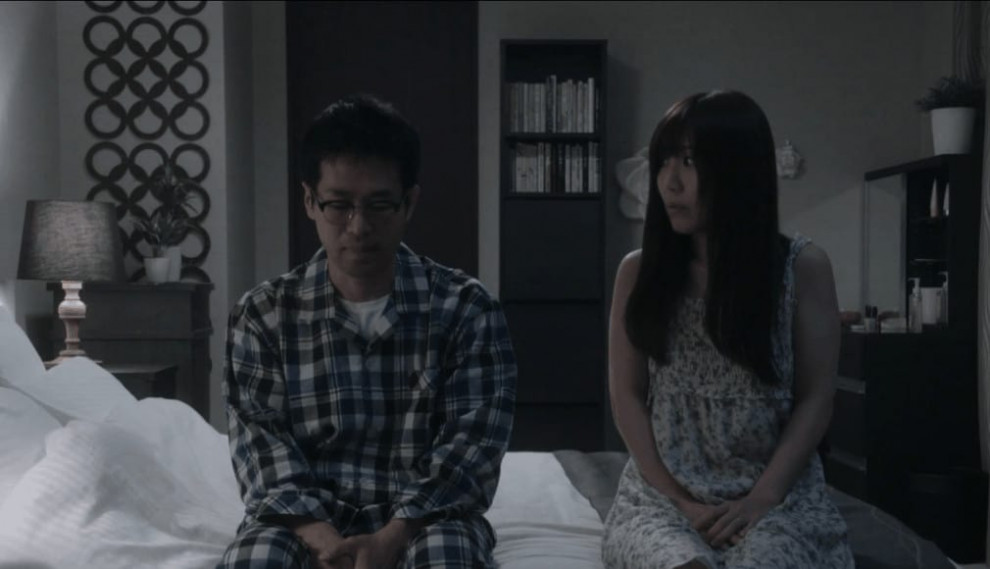After years of being shot in the same format, a recent change in the creation of pinku films with the shift into digital shooting style has been making waves across the scene. Not without controversy, as some decry the professional look of these films while others enjoy the new change such as freeing the filmmakers from many of the old budgetary constraints, one of the first films in this style was Minoru Kunizawa's “Dismembered” (also known under the original title Tôsui tsuma: Hakudaku ni nureru yawahada) which is not without its charms.
Dismembered is available from PinkEiga.TV
Waking up in his apartment, psychiatrist Takuma Kuga (Goro Shimizu) learns that he is being held captive by patient Aya Misawa (Ito Yoshikawa) and that one of the tortures inflicted upon him is the loss of his manhood. When he escapes with the help of his wife Shiori, (Saki Mizumi) his eventual recovery comes complete with a donor piece that greatly affects their lives together. Shortly afterward, he begins to experience strange visions of a woman he's never met, which begins to affect the relationship as he seeks out Sayoko Hirosaki (Akari Hoshino), the girl behind the visions. When they begin a relationship together, it soon develops into another personal tragedy.
For the most part, this one wasn't that bad. The best part is the rather strong storyline here. It's quite enjoyable how it manages to make the connection between what's going on between Takuya and Shiori, as a result of the surgery. He becomes a lot more outgoing and affectionate, which drives their sex-life into territory neither is really expecting. Even though the visions' angle is a tad underdeveloped, that this comes up gives the film a pretty engaging piece to work out, beyond their extramarital issues. Since this means plenty of fine nudity, as the couple rediscovers their sexual energies together, ‘Dismembered' manages to move along at a steady pace as a result, once the visions-angle gets introduced. Even the recurring joke about waking up in the hospital due to a severed unit is rather humorous, and the final punch-line is good for a laugh.
The cast here also delivers quite admirably. The first of the main leads, Goro Shimizu, does rather nicely as the husband. His geeky persona might make the affection angle a little hard to swallow, but his outwardly noticeable zeal, after the initial encounter, is fun to watch. He handles these scenes much better than after the discovery of the erotic visions which really downplays much of what came before. Saki Mizumi is quite impressive overall here. Every bit the shy Japanese housewife, her vigorous approach to the lovemaking scenes gives her a strong impression. The two have nice chemistry in and out of the bedroom, which makes them a couple worth rooting for. The only other character worth mentioning is the troubled Sayoko Hirosaki, played by Akari Hoshino. Every bit the troubled street-rat she appears to be, her involvement as the woman at the center of the visions means she comes in late but still leaves a solid mark.

Given the big charge into the digital age, this looks incredibly good. This is apparent in the cinematography by Masahide Iioka, which has quite active role in the film. His camera ends up sweeping through the scenes, offering more life and energy than expected. The whole film contains a rather professional gloss as well with the manner of how sleek and engaging, as a whole, it comes off. Despite not much happening here, the energetic and engaging camera-work is good to make this feel quite high-end during these quieter moments. The change in production style is off to a nice start based on this release.
If the film has a failing at all, it's in the surprisingly unsexy scenes at the beginning. Granted, as they show Takuma being taken advantage of, the fact that Misawa is still trying to seduce him should mean these scenes have some sexual heat generated. Instead, there's not much of anything happening there. The bound-and-gagged nature of his being held captive results in very little tension, and there's not much about the grinding that transpires which becomes arousing or stimulating. The first night together between the two of them is just unintentionally hilarious, based on the censorship constraints forcing her to manually and orally stimulate nothing but air. This effectively ruins the energy and heat of the moment considerably. Although it does pick up later on, this lack of heat early on is a distressing hurdle to get over. The other minor issue here is the lack of cohesion about what's going on with his unit. It seems to follow several different ideas about who Takuya is and none of them are coherent so it leaves the film confusing to follow through.
Despite this minor issue, the film still has some enjoyable and engaging elements that make it work rather well. The switchover into the digital age is a big issue and seems to make the film look professional on all fronts, giving this enough to like for those who appreciate this kind of exploitation.















